RECAP: Twentynine Palms City Council Meeting, May 27, 2025
Grant presentations, new rules, and controversy; ancillary business permits unresolved yet again; and small businesses push back against permit requirements

In a marathon workshop and Council meeting that pushed the three-hour mark (marathons are a theme of this recap), Councilmembers and community members sparred on grant funding and ancillary business permits. After several closed sessions, the City Manager’s new contract was finally approved. The agenda for this meeting is here and our agenda preview is here. Video of the meeting is available on YouTube.
The regular Council meeting agenda was preceded by a workshop where representatives of nine organizations made their best Shark Tank pitches for a piece of $50,000 in City grant money. Recreation Division Manager Kary Minatrea ably managed these heartfelt presentations to Council, who had few questions but showed appreciation for the community’s efforts.
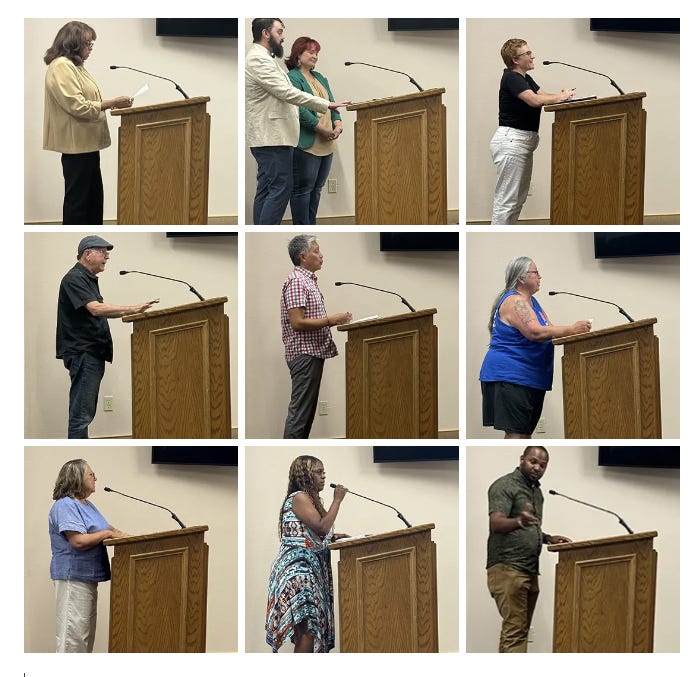
The Desert Trumpet took a look at these local nonprofit organizations in our agenda preview for this meeting. All organizations listed pitched their visions except for 29 Palms 29ers.
Funding decisions will be communicated in June, with funds disbursed when the new fiscal year begins in July.
AWARDS, PRESENTATIONS, APPOINTMENTS AND PROCLAMATIONS
Southern California Edison Update
Shane Massoud, Government Relations Manager for Southern California Edison, updated the Council and City residents on power grid upgrades and other SCE initiatives.
Massoud gave an overview of how the electrical grid works, explaining that SCE serves more than 15 million people across California, including 29 Palms. SCE invests about $5 billion a year to maintain and upgrade 1.7 million poles, 750,000 transformers, and more than 126,000 miles of lines.
Massoud explained the five types of outages: planned maintenance, unexpected repairs, emergencies, public safety shutoffs (used only in high fire-risk areas), and outages caused by other public agencies. Councilmember McArthur Wright asked, “when you said about a public safety outage like high winds. Does that mean if we have high winds, you actually turn the power off?”
Massoud answered:
Yes, it’s our Public Safety Power shut off (PSP). This is a program that was approved by the California Public Utilities Commission in 2012. So essentially what this allows us to do is, when the winds meet at a certain threshold — with dry vegetation, low humidity — we will proactively shut the power off in high fire areas. 29 Palms is not considered a high fire area.
He stressed the importance of keeping contact information up to date so customers can get outage alerts by phone, text, or email. He suggested resources like those found here that allow residents and businesses to track and report outages. To be prepared for outages Massoud offered these recommendations:
Learn if your family qualifies for Medical Baseline to help with power costs or the Critical Care backup battery program for medical equipment
Keep important phone numbers such as the hospital, doctors, relatives, close by
Learn how to manually open garage doors or gates
Find your service entrance panel and learn how to turn your electricity off
Consult with a licensed electrician before installing a home generator
Create a family preparedness plan
Recent outages that disrupted local businesses in downtown Twentynine Palms were caused when SCE upgraded the Old Dale circuit from 4.8 kV to 12 kV, which he advised would make the grid more stable in the area. He assured the audience that no future outages would be necessary to upgrade this grid.
Additionally, SCE is beginning improvements on the 29 Palms substation on Adobe Road to replace aging equipment and increase capacity, and adding grid automation to help isolate problems faster and restore power more quickly.
Grant Monitoring Process
City Finance Director Abigail Hernandez-Conde introduced new rules for monitoring how grant money is spent. These changes, she said, are meant to improve transparency and accountability for grant programs funded by the City.
She highlighted three requirements:
Use of Funds. Grant money must be used for the approved program, not for personal items like salaries, benefits, or she noted, to laughter from the audience, trips to Starbucks.
Eligibility Check. Before money is awarded, the City will check if the recipient is in good standing with the state’s nonprofit requirements. If not in good standing, they won’t receive funds.
Reports & Records. Groups must submit detailed performance and financial reports, including how many people were served and where the money went. Unused funds must be returned, and records must be kept for three years.
In response to a question from Eric Menendez, Hernandez-Conde said these requirements would apply to the three grant programs funded by the City: nonprofit grants managed by Parks & Recreation and described above, Public Arts Advisory Committee (PAAC) grants, and Tourism Board Improvement District (TBID) grants.
PAAC Committee Member Xárene Eskandar asked if the City could use the same scoring system (which she called a "rubric") across all grant programs. Right now, each group uses different rules to decide who is funded. Hernandez-Conde replied that these guidelines are for checking how the money is used after it’s given—not deciding who gets it, but that “it's a policy issue that the City Council could actually look at in the future.” The issue of the need for clear guidelines for awarding grants would come up later in the City Council meeting.
PUBLIC HEARING
9. Ancillary Activities, Businesses, and Entertainment
In a nod to the complexity of being a Councilmember in a small town, prior to the start of this item Councilmember Daniel Mintz indicted that he’d be recusing due to its potentially impacting his business and remaining out of the room for item 10 due to the proximity of Project Phoenix to his wife’s business.1
Community Development Director Keith Gardner noted, “We have had three business community meetings, two workshops at the Planning Commission, one public hearing at the Commission and one at the City Council. Today, we come back for the second [Council] meeting.” Defining ancillary activities and how to regulate them has proven surprisingly contentious, and the Desert Trumpet has covered it in depth here and here.
Gardner explained that a key focus of this development code amendment is on ancillary uses and businesses—services or businesses within a primary business. Gardner gave the examples of an ancillary use such as a lunch counter owned by a grocery store or ancillary business such as a Burger King inside a Walmart (owned separately but accessed through the Walmart entrance). The amendment sets clear rules for these ancillary activities, particularly ancillary businesses. Gardner advised that ancillary businesses must operate entirely inside the main business, share the same entrance and hours, and use no more than 25% of the space.
These ancillary businesses typically require higher-level permits such as a Conditional Use Permit (CUP), and the amendment proposes lowering the permit level to make it more affordable and efficient.
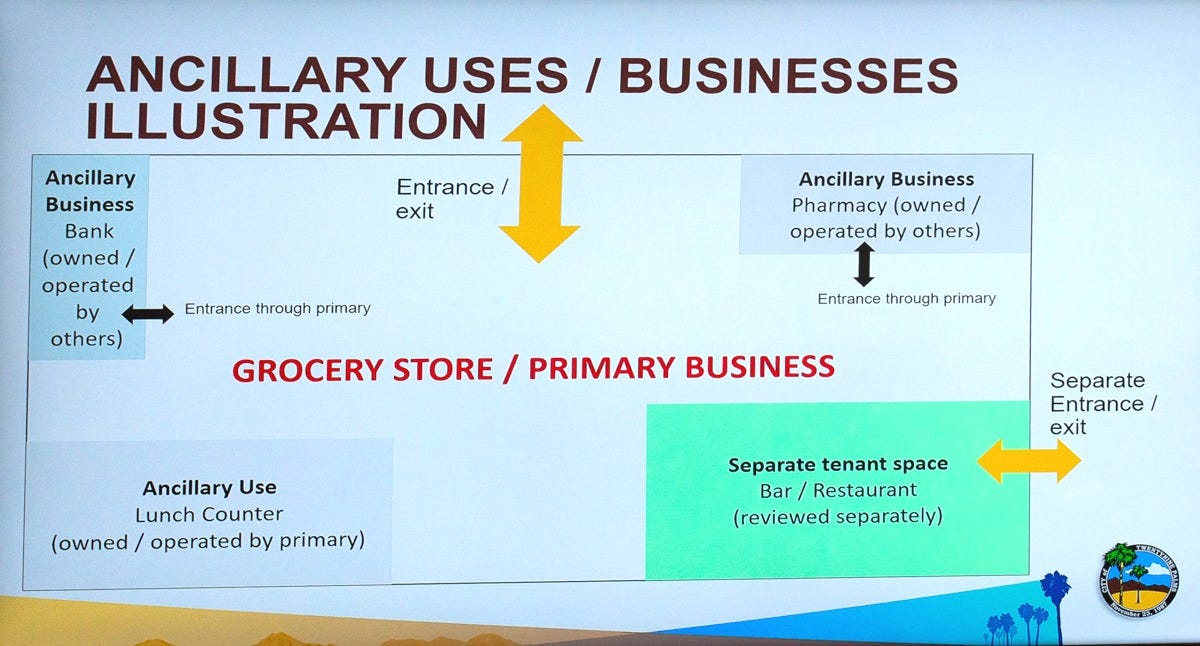
Another major update involves ancillary entertainment. Currently, live entertainment requires a costly permit when taking place in a venue that has a different primary use— live music in a restaurant for example. The proposal introduces a new, easier to obtain entertainment license, with a suggested cost of $550, as long as the business stays within safety, noise, and parking limits. There would be no restrictions on entertainment type or frequency if rules are followed. This license would be tied to the business license and renewed annually.
After approval by City Council, Gardner said, applications would open July 1, aligning with the fiscal year. However, his aspiration wasn’t to be fulfilled.
In public comment, Susan Peplow said,
I'd like to express my support for most of the recommended outlines…I believe it's a strong step forward to economic development in 29 Palms, removing some of the initial barriers to entry for entertainment is a smart move. Our local businesses are constantly evolving, testing new ideas to attract customers and offer more to our community. Making it easier to try something new without unnecessary hurdles is the kind of policy that encourages economic growth.
She did have concerns, however, notably a requirement for two annual safety inspections, which she thought excessive and burdensome. “If safety is the goal, one thorough inspection per year should be enough.” She also thought the cost should be brought in line with the vacation home rental (VHR) inspection, which is $222.75 and would keep things fair and consistent. She finally noted that the staff report mentions that violators may face a large fine or suspensions, but the draft doesn't outline those penalties.
Councilmember April Ramirez had questions:
If safety inspections are required for all businesses or only those applying for entertainment licenses?
If a building housing multiple businesses is unsafe, do all businesses need to close?
What are the specific, clearly stated consequences (fees, suspensions) for noncompliance?
Keith Gardner responded that Inspections apply only to entertainment-related licenses to ensure safety and code compliance. If the main building is unsafe, all businesses inside may need to cease operations. Consequences, he said, will vary case-by-case, depending on severity (e.g., multiple service calls vs. an honest mistake).
Councilmember Ramirez then said,
I'm going to be very clear in saying this, this is not directed at any one, specific business. This is not intended to scrutinize or attack anybody. But I'm more concerned about the process…The whole reason this started was because there was a business within a business, and this was not something that we had seen before. But it's my understanding that we have not voted on this yet, and that business was given a permit to move forward.2
Ramirez framed this as circumventing Council authority and a procedural failure. She questioned City Manager Stone James on whether he authorized the permit in question. He denied doing so and affirmed he would investigate.
Councilmember Octavious Scott3 said that the points about fees were good ones and should be considered. Mayor Steve Bilderain suggested the discussion of ancillary activities should be tabled and taken up again in the future. The Council voted 4-0-14 to take up this matter again at the next Council meeting.
DISCUSSION AND POTENTIAL ACTION ITEMS
10. Preliminary 2-Year Project Phoenix Funds and Sewer Fund Budgets FY 2025-26 & 2026-27.
Finance Director Abigail Hernandez-Conde returned to the podium to give a preview of the 2025–26 budget, focusing on Project Phoenix and the sewer fund. No vote needed to be taken, she said, and she’ll return with full budget details on June 10, including general, special, and project-specific funds. All budgets must be approved by July 1.
Project Phoenix funds support downtown redevelopment. About $185,000 in unused project money is still available, with remaining allocations such as:
$108,000 for the business façade program,
$29,000 for street furniture,
$24,000 for lighting fixtures, and
$15,000 for public art at Freedom Plaza.
There's also $160,000 in housing funds still available, after $1 million was committed to Milestone Housing for an affordable housing project.5
For the sewer fund, two big projects are in the works:
A USGS sewer study, which needs about $100,000 more to be fully funded.
A larger sewer project, the package treatment plant for Freedom Plaza, needing $1.7 million, with required City matching funds already set aside.
Operating costs for the wastewater collection system at Freedom Plaza are around $82,000, with most covered by the General Fund and sewer fees.
Hernandez-Conde will provide updates and final numbers in June.
Councilmember Octavious Scott said, “we have a future Council initiated item to discuss shade structures and a possible art fixture with Freedom Plaza architecture. And I was just wondering, is there anything in the budget that could be used for that?” Hernandez-Conde thought money available for street furniture could be used for shade structures.
11. Preliminary Two-Year Special Revenue Funds Budget for Fiscal Year 2025-26 & 2026-27
Hernandez-Conde continued with a presentation on the City’s special funds and capital projects for the next two budget years. These special funds—such as Community Development Block Grant (CDBG), Measure I (sales tax), lighting, and public access TV—are used for specific projects. Revenue, she said, comes from gas taxes, grants, and fees.
Gas tax revenue is expected to reach about $2.1 million, with only small increases expected in the next two years. This money goes toward street maintenance, safety improvements, and other infrastructure.
In total, the City is working on nearly $20 million in capital projects, including:
$4 million for streets (like SR 62 improvements and chip sealing),
$439,000 for trail design,
$589,000 for safety projects,
and $1.5 million for other work like the animal shelter, senior center, and Homekey housing.
Some smaller items include curb and sidewalk upgrades, flood control at Luckie Park, and setting aside $25,000 for a future street sweeper.
Councilmember Scott asked, “I noticed that there were a couple of projects there where CDBG was the funding source…. I was doing research regarding blight removal in our community, and I just saw an opportunity that maybe next time, when we receive CDBG funds, that we use those funds for blight removal.”
City Manager James responded, “We have done a little research, and it does appear as though it could be allocated for the blight removal…If we were to address the blight, and remove the house if it was too dilapidated to service, then could we find funds to build a house on top? I don't know of any mechanism to increase our funding from the County. We can certainly ask.”
Hernandez-Conde added that, in addition, the County time frame is tight: “they approve it, and then the next month, they’re already, like, “Oh did you spend it?” whereas “it takes months before I can bring a contractor in.”
12. First Amendment to City Manager Employment Agreement
Councilmember Mintz and the Mayor worked on a subcommittee to review City Manager Stone James’s compensation after his first year. They recommended a 2.5% salary increase to align with his employment anniversary date. This is in addition to the cost-of-living adjustment (COLA) provided to all City employees, effective when the new fiscal year starts in July.
The Council is also considering allowing James to cash-in unused administrative leave time.
Right now, James has an annual base salary of $176,425.60 not including benefits, which was negotiated into his first employment contract dated March 26, 2024.
If the increases are approved, the City Manager will receive $180,836.24 backdated to March 26, 2025 with an additional 2.5% cost of living adjustment based on the new salary amount in July resulting in an total increase to $185,357.15, not including benefits.
In public comment, Carlos Blandon said, “I have concerns about our current budgetary deficit, and particularly with what I have feel is a gross over-expenditure for the salary and subsidized housing for our Community Development Director6…We continue to pay luxury for City employees who could pay their own ways, as the majority of the workforce here has to do.”
The Council voted 5-0 to approve the City Manager’s compensation package. James thanked the Council and said,
It's been a pleasure to serve the community and a pleasure to serve the Council. Excited to see where we have been and where we're going. To see the staff working together to identify the different opportunities — the different actions we need to take in order to continue on the momentum that is built within the downtown, that has been built just generally within the overall area. It's pretty exciting. I consider it an honor and a privilege to be in this role.
FUTURE COUNCIL INITIATED ITEMS
Councilmember Ramirez asked that a development code item be reviewed to clarify what kind of dog walking and pet grooming businesses could be operated as home businesses (19.102.100 - Keeping of Animals and 19.32.060 - Operating Standards/Conditions of Approval), saying:
One of the constituents that wrote to me essentially said that she does dog walking and sometimes pet sitting for military families that either go to the field or have to leave or in are transition. And she was really upset to receive a cease and desist letter from the City. So I wanted to make sure that we're doing everything that we can to empower people to do it and really make sure that the rules are not excessively restrictive.
A workshop on this item is on the upcoming Planning Commission agenda.
PUBLIC COMMENT
Community members wishing to make public comments patiently waited two and a half hours to do so. Marjorie Smith, of the High Desert Emergency Action Alliance and the Red Cross praised the City on its first emergency preparedness event held May 17. As it happened, the meeting transitioned into a real emergency event when parts of Twentynine Palms were blocked off to investigate the Palm Springs IVF clinic bomber. She spoke of the heroic efforts by the Red Cross coordinator, who drove to Barstow and Yermo to retrieve cots for the evacuation center at Freedom Plaza. “My call to you is we need to encourage the volunteers in this community to get trained by the Red Cross so that we do not have to wait for someone to come from far away with cots.”
Carlos Blandon spoke about trash that he claims has blown away from the Reset Hotel construction project and “did not follow the simple protocols established in their permit that the community developer [development director] gave them. What else do they think they can ignore…?”
Susan Peplow commended the City for its communication during the May 17 neighborhood evacuation. She also praised the Planning Department for its postcard mailing on trash, lighting, and other ordinances, which she said are good educational tools. Peplow encouraged attendance at the May 29 TBID meeting to provide guidance and oversight to the challenges the board faces:
It really dovetails into what Councilmember Ramirez was saying about kind of keeping things square and fair…TBID awarded a $20,000 grant to an event [a half marathon to be held by Vacation Races in Joshua Tree] that is not in 29 Palms, nor was it within the sphere of influence, specifically located for Wonder Valley and Desert Heights. Joshua Tree is not in the sphere of influence, and it's not in the grant program, and they were awarded them a grant…I looked at the grant applications, I personally didn't catch it. We have a subcommittee that didn't catch it, so I do think its just an oversight, but that's a $20,000 oversight to put an event on in Joshua Tree.
Anna Stump shared that a small committee of three residents from 29 Palms are pursuing a grant from the Levitt Foundation.
I’m involved because I was part of the team that previously secured a $100,000 arts grant. The committee is led by Audrey Philpot, who has advised the City on events, and includes a new local attorney, Jordan Ash. We're applying for a three-year grant of $40,000 per year ($120,000 total) to host 10 free, family-friendly concerts annually at Freedom Plaza. The Levitt Foundation supports small communities under 250,000 in population. We've already spoken with Scott Clinkscales, who is excited about the idea, and we're starting outreach for letters of support. We believe this would greatly benefit both the community and tourism.
Eric Menendez expressed disappointment with the City’s community engagement.
Caitlyn Gill, owner of Joshua Tree Astronomy Adventures, thanked 29 Palms City Council and staff for their involvement with the Youth Council. She shared that the company sponsored a teen astronomy night, which was designed and hosted by the Youth Council in partnership with Sky's the Limit Observatory. The event, held on Friday, May 23, drew around 150 attendees—mostly families and teens—who enjoyed viewing the night sky through large telescopes. She commended the Youth Council for their professionalism and strong engagement, describing them as excellent hosts.
Caitlyn Lynch, who works at the Bun Bun Beauty Bar, spoke about her concerns over the challenges faced while the salon navigated the business licensing process for a new location. While she said their first experience in 2023 was straightforward—with a $200 fee and a quick turnaround—this time they have spent more than $1,400 in fees, excluding additional costs like a title report, and are still waiting for approval.
She expressed frustration over a lack of clarity and inconsistent communication from City staff, citing conflicting information and unexplained changes—such as a site plan reduction and shifting timelines from 30 to 60 days, then to 60 to 90 days. “When policies change, they should be clearly communicated and applied equally to all businesses. We love this City, and we want to grow here, but delays and unclear requirements make it hard for a small business to thrive.”
CITY MANAGER’S REPORT
City Manager Stone James acknowledged City efforts to proactively communicate with residents about neighborhood closures caused by searching the home of the IVF clinic bombing suspect despite not being the lead agency—the FBI held that role due to the nature of the investigation and safety concerns. The FBI prioritized the safety of their personnel and other first responders, which limited information sharing. He expressed gratitude to the community for their patience during the evacuation.
James also thanked Councilmember Scott and the dozens of community members who participated in the recent cleanup of the Starlight Neighborhood in District 4.
The City Manager reminded residents that the City’s strategic plan is available online, encouraging them to participate in the survey to share their input. He also warned of a potentially active monsoon season ahead, emphasizing the importance of emergency preparedness.
Finally, James addressed concerns about a half marathon event in Joshua Tree, explaining that the race attracts thousands of runners who often stay for multiple days, filling local accommodations, and emphasizing the event’s significant economic impact on the area.7
Speaking out of order, Eric Menendez added his concerns over the $20,000 grant to Vacation Races. Mayor Bilderain finally closed the meeting with the City Council leaving to attend yet another closed session on anticipated litigation.
Leave your thoughts in the comments below. Please note that we do not allow anonymous comments. Please be sure your first and last name is on your profile prior to commenting. Anonymous comments will be deleted.
Feel free to share this article!
Are you subscribed?
Desert Trumpet added the note about Councilmember Mintz recusing on June 1, after the article was published.
Councilmember Ramirez appears to be referring to a barber studio attached to the exterior of Jeanine Beauty Supply, an issue we covered here and here. Having visited the business in question, Desert Trumpet observed that it has a separate entrance so, per Community Development Director Keith Gardner’s chart, it would be considered a “separate tenant space,” not an ancillary business, therefore not subject to the new code.
This quote was originally misattributed to Councilmember Daniel Mintz. Correction made 6/1/2025.
The vote was originally reported as 5-0, but given theat Councilmember Mintz had recused from this item, the correct vote is 4-0-1.
Possibly the apartment project slated to be built next to City Hall.
The City owns a house in Indian Cove that was used by prior Community Development Director Travis Clark, and is now used by Keith Gardner during the four-day City workweek. Both reside down the hill.
What Stone James is describing is appropriate for sponsorship grants which do not have a location requirement and which the event has received in the past, not for event grants, which have a location requirement.


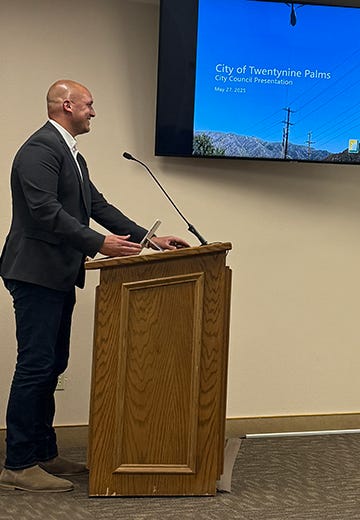
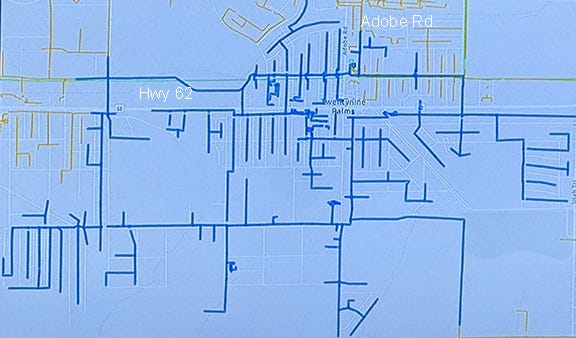
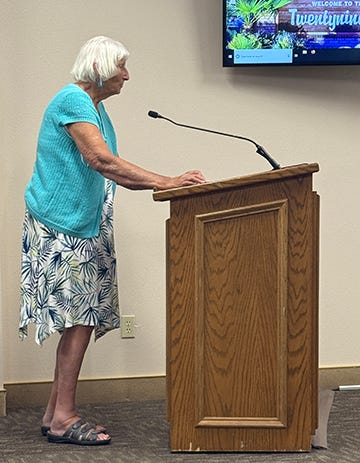
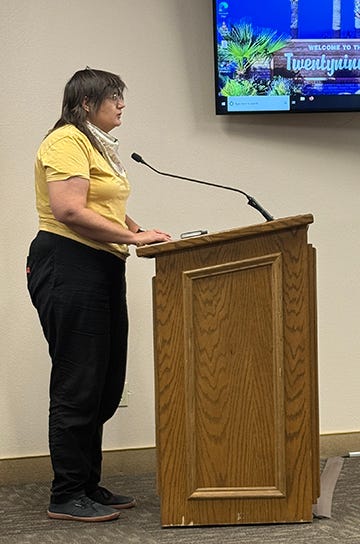
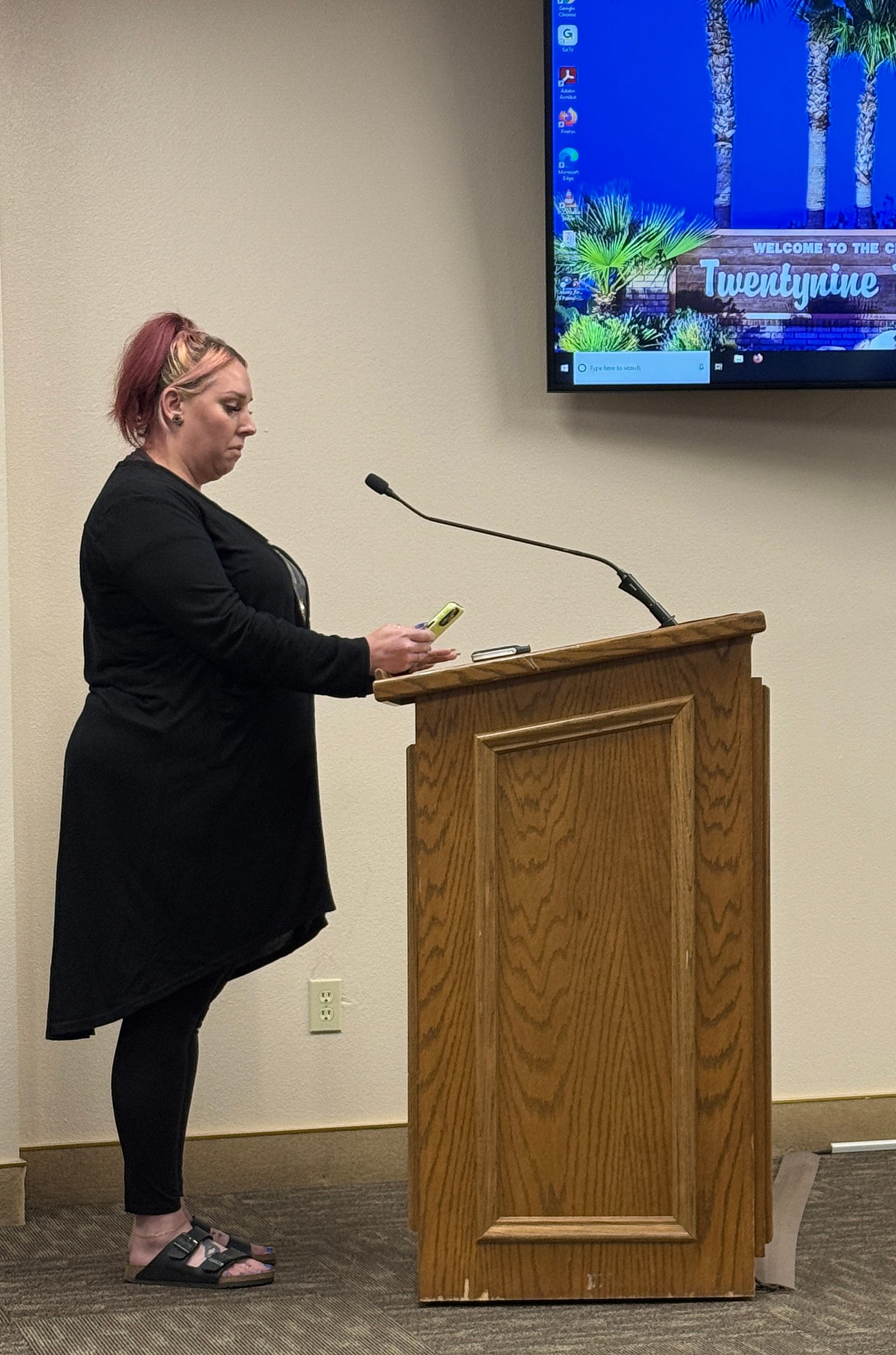
I'm glad I live in the county.